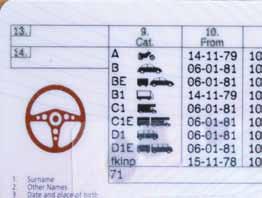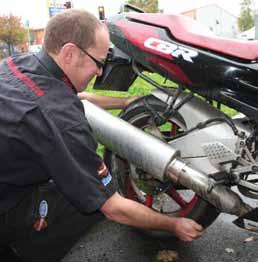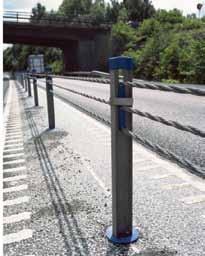
10 minute read
BMF News
News
CYCLES AND CURvEBALLS
Advertisement
Craig Carey-Clinch – Executive Director, National Motorcyclists Council (NMC)
We sometimes hear about the political ‘cycle’, which refers to a period when a party is in power, the time between general elections or between Queen’s Speeches. But there’s yet another one, a period when lobbying and campaigning is more active, particularly as public policy affects motorcycling.
This tends to be between New Year and Easter, with things starting to tail off a little towards the summer, enlivened with major campaign events in Parliament in June and July before the summer recess. Summer is the ‘silly season’ where Parliament shuts down and the civil service goes off on holiday. It’s a slow period where the lobbyist catches up with all sorts of background work left over from the earlier part of the year and prepares for the autumn.
Politics takes off again after the party conference season, with a spurt of activity culminating in campaigning events in November and December, before all goes quiet again over the Christmas recess.
BETTER THIS WAY
Planning a year and deciding when ‘headline’ activities should take place used to be fairly predictable, but Covid has wrought changes. For example, with no external events taking place in Parliament for such a long period, lobbying has become more fluid. Departmental officials are wary of leaving their Zoom screens and the backdrops of their spare bedrooms, while MPs and ministers have also settled into a routine of on-line working.
On one level this has led to much more dynamic working. The yearly cycle of busy and quiet periods has been replaced with a much more even level of activity through the year, as both officials and MPs have become more accessible than the strictures of a pandemic and lockdowns would suggest.
Personal face to face interactions (much missed) have been replaced by more dynamic working and in many cases better day to day dialogue. Physical meetings with their long lead times, and time/cost consuming travel, have given way to regular phone conversations and, “shall we hop into a Zoom for a few minutes.”
With this more stable way of working and campaigning becoming established, the summer recess this year has been more active than during pre-pandemic times. No talk of silly season in the media nowadays, as officials in particular are unable to hide behind the hinted departmental summer shutdown, despite no such thing ever existing.
So although the summer is inevitably quieter due to holidays, the NMC has been able to consolidate several areas of policy work and maintain regular contact with MPs and officials on a range of issues where initial Council successes need to be translated into policy results.
vISION ZERO
NMC work on a new motorcycling strategy is moving on, and the Department for Transport DfT has been initially receptive to our ideas, but there is some debate about whether new policies should be expressed as a strategy, or via some other means. The NMC view is that as long as we see headline policy parity for motorcycling alongside other non-car alternative forms of transport, the semantics of how this is presented are less important than getting the policies right.
To a great extent, our policy calls have needed to run alongside the work the Government has started on a new road safety strategy. That’s because the initial ideas put forward by DfT reached beyond safety into wider areas of transport policy under other objectives such as levelling up. The NMC sees this as an opportunity to make the case for motorcycling beyond safety in itself, particularly as better investment in motorcycle safety relies on motorcycling itself being viewed positively in public policy.
As part of this, the NMC is promoting an evolution of the Vision Zero narrative. Vision Zero has many laudable aims, but its promotion has become conflated with active travel (walking and cycling). The result is that most safety investment goes into walking and cycling, while motorcycle safety remains poorly funded. It’s hardly a strategy which will lead to the zero deaths and serious injuries desired by the Vision Zero philosophy. The NMC feels that Vision Zero should be expressed via a ‘welcoming roads’ message which does not discriminate between road user types, so leading to a more even and positive result for safety.
LICENSING
The UK’s departure from the EU has created an opportunity to reform our motorcycle licensing laws, and the NMC has published a series of proposals.
We’ve suggested that new riders should be allowed to take theory and hazard perception tests before taking the CBT and that the A2 licence be removed (ie returning to just A1 and A licences, as it was before the Third Driving Licence Directive). Also that upgrading from A1 to A licence could be done by additional training after holding the A1 licence for a year. Secondary legislation is now in the parliamentary programme which will change the minimum test vehicle requirements for the A2 licence – you will be able to use a smaller capacity bike to take the test. This parallels a similar change in the EU.
We were surprised to discover that deaths and serious injuries have notably risen since the introduction of the two-part test and the Third Driving Licence Directive. This is in very marked contrast to the period before the licensing and testing laws started to change in 2009, so the rise does appear to be linked to these changes. The primary reason to introduce the change was to improve motorcycle safety. Given that the opposite has occurred the NMC is calling on the government to think again.

WATCH THOSE CURvEBALLS
Although the old seasonal ‘cycles’ have changed under the pandemic, the ability for policy makers to throw serious curveballs into motorcycling out of the blue remains a constant. Anti-tampering (see the news story on these pages) currently looks like it could be one of these and the NMC will be working with its members to protect motorcyclists’ rights and freedoms to modify their bikes. Plus continuing to develop its work in wider policy areas. Busy times lie ahead.
LOBBY NEWS ROUND UP
FROM AnnA ZEE, BMF’S POLiTicAL And TEcHnicAL SERvicES diREcTOR

ANTI-TAMPERING
Department for Transport officials have reassured representatives of the NMC, including the BMF's Anna Zee, that motorcyclists have nothing to fear from the recent anti-tampering consultation.
The original wording of the consultation – a maze of legal language – implied that any modification of a machine could be outlawed, and classed as 'tampering,' although the spirit of the wording was aimed at items which increase noise or emissions, such as aftermarket exhausts without a catalyser.
Anna Zee said: “We were invited to a meeting with DfT officials on 27th October to discuss this section of the consultation. They were quick to admit this could have been worded better; it is NOT intended to prevent customisation of bikes or the fitting of aftermarket products which do the same job, or better, as the original equipment. It IS intended to apply to anything which affects emissions, the computerised systems which are installed and such devices as the dongles advertised for increasing the speed on e.g. e-scooters.”
She added that any legislation is likely to be retrospective, so if a bike was fitted with a catalyst when new, but a replacement exhaust doesn't have one, this would count as tampering. “The DfT has agreed to send us details of where they think there are gaps in existing legislation,” she said, “and that they will further consult with us in the process of drafting the future legislation, which is unlikely to come into effect until 2024.”
So, we can all rest easy for the time being – fitting a hugger, different seat or topbox, or building a custom bike – won't count as tampering, so long as it remains true to the emissions limits which were in place when the bike was new.
Some areas of the proposed legislation still need to be clarified, such as possible exemptions for competition and off-road bikes, plus classic machines. The NMC argues that modifications to classic bikes can improve running without increasing performance.
Jim Freeman, BMF Chair, applauded the work of the NMC in obtaining swift clarification from the DfT. “The BMF feels vindicated in its support of the NMC, from its earliest stages, as the united voice of motorcyclists when talking to government. There is little doubt that had this consultation been made before the creation of the NMC, that the various motorcyclists' groups would have been much easier to ignore.”

THIRD PARTY SHIPPING
Work on the issue of third-party shipping of motorcycles into the EU for tourism continues. The NMC has had discussions with civil servants in the Cabinet Office on the issue, and it is agreed that accompanied bikes, ie with owner present, are not a problem, and I understand this has been proved so by TRF members. We are still awaiting updated advice on gov.uk.
Progress on the issue of shipping bikes via third parties has stalled because while the Cabinet Office agrees that it is a real difficulty it is not regarded as high priority.
A petition has been started about shipping via third parties here: https://petition.parliament.uk/petitions/598889
ROADS & BRIDGES
Changes to the Design Manual for Roads and Bridges seem to be taking account of motorcyclists. This snappily-titled book is the design bible used by National Highways. Incidentally, National Highways was formerly known as Highways England, which was formerly known as the Highways Agency. It doesn’t seem very long since the last rebranding, or have I been doing this job a tad too long? Some years ago Highways England set up a Motorcycle Working Group. A subgroup was later formed to discuss infrastructure and I am happy to say that the Manual revisions show signs of being influenced by its work. The section on vehicle restraint systems, (ie barriers) CD377, now specifically says that motorcyclists must be considered when specifying barriers. Generally National Highways now install concrete barriers on central reservations, certainly on motorways, but it is not yet clear to me whether wire rope barriers are allowed anywhere else. There should have been changes also to National Highways inspection and maintenance procedures but those do not form part of the Manual.

GOOD NEWS ON EURO NCAP
Fve years ago the Dutch research body RDW (at the behest of motorcyclists' groups including FEMA) did some research into whether automated systems in cars could see and react to motorcycles. The answer then was a depressing ‘not very well,’ particularly when the motorcycle was being ridden to the side of a lane rather than right in the middle.
This will now have to change. The EuroNCAP system (NCAP = New Car Assessment Programme) will include testing for this from 2023. It will be included in the testing of systems such as autonomous emergency braking and lane keeping assist.
And while on news from Europe, you might have noticed reports that MEPs support installation of ISA (Intelligent Speed Assistance) on motorcycles. However the EU Commission is actually aware that ISA in its current form is not suitable for bikes. FEMA will continue to oppose systems which take control away from the rider. ISA is part of the General Safety Regulation proposals to be adopted in the EU but it does not apply to motorcycles.

NEW FACES AT THE BMF
We’d like to welcome two new faces to the BMF office – Cheryl McMonnies (Membership Secretary) and Emily Rochester (Government Relations Executive Trainee). “I fell in love with bikes when I was introduced to the world of rallies in the mid ‘90s,” says Cheryl. “There’s nothing better than getting together with like-minded people, listening to music and the sound of Above: Cheryl McMonnies motorbikes. Below: Emily Rochester “To me, the biking world is about freedom, community and acceptance. It’s also an environmentally considerate way to travel that doesn’t cost the earth. “My first bike was a 250 Superdream before I moved on to a Ducati 620 Dark, though I am now looking for something else! I’m looking forward to becoming an integral part of the BMF family.” Emily adds: “I have helped out in the BMF office for a couple of years, whilst studying for my Law degree, so I am really excited to begin my new role. I look forward to learning all I can from Anna and colleagues and working with her to continue protecting and promoting riders’ rights. I have recently moved into my own house with my boyfriend and we have recently taken on a rescue cat and kittens, so life is never dull.”










